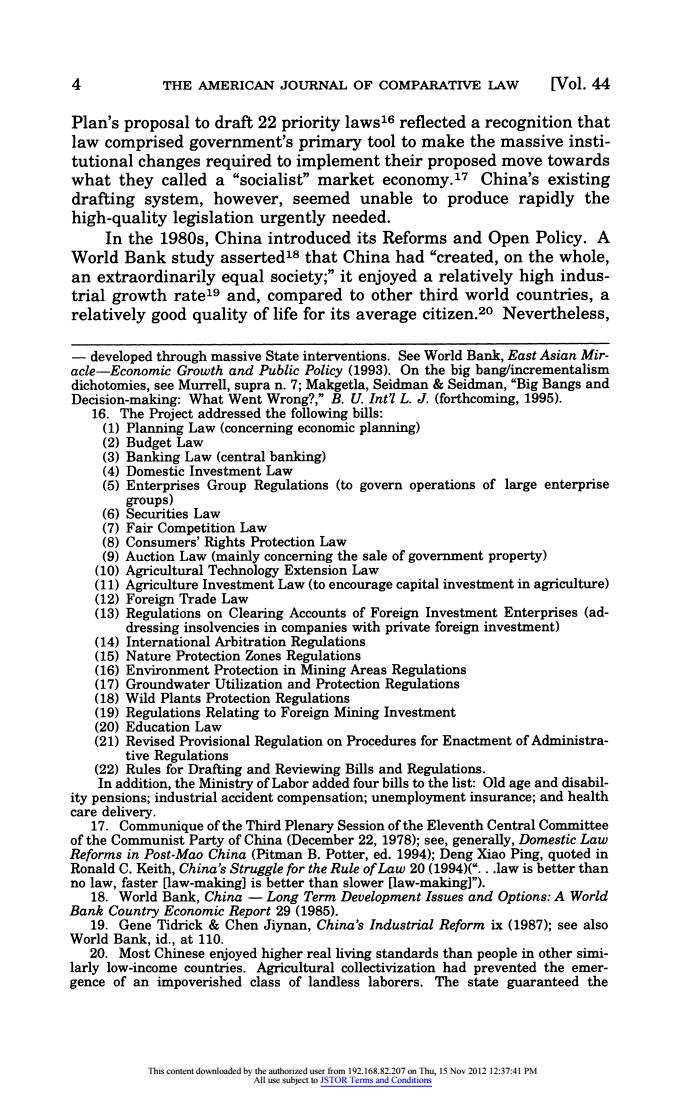正在加载图片...

4 THE AMERICAN JOURNAL OF COMPARATIVE LAW Vol.44 Plan's proposal to draft 22 priority laws16 reflected a recognition that law comprised government's primary tool to make the massive insti- tutional changes required to implement their proposed move towards what they called a "socialist"market economy.17 China's existing drafting system,however,seemed unable to produce rapidly the high-quality legislation urgently needed. In the 1980s,China introduced its Reforms and Open Policy.A World Bank study asserted18 that China had"created,on the whole, an extraordinarily equal society;it enjoyed a relatively high indus- trial growth rate1s and,compared to other third world countries,a relatively good quality of life for its average citizen.20 Nevertheless, developed through massive State interventions.See World Bank,East Asian Mir- acle-Economic Growth and Public Policy (1993).On the big bang/incrementalism dichotomies,see Murrell,supra n.7;Makgetla,Seidman Seidman,"Big Bangs and Decision-making:What Went Wrong?,"B.U.Int?L.J.(forthcoming,1995). 16.The Project addressed the following bills: (1)Planning Law(concerning economic planning) (2)Budget Law (3)Banking Law(central banking) (4)Domestic Investment Law (5)Enterprises Group Regulations (to govern operations of large enterprise groups) (6) Securities Law (7) Fair Competition Law (8) Consumers'Rights Protection Law (9)Auction Law(mainly concerning the sale of government property) (10)Agricultural Technology Extension Law (11)Agriculture Investment Law(to encourage capital investment in agriculture) (12)Foreign Trade Law (13)Regulations on Clearing Accounts of Foreign Investment Enterprises (ad- dressing insolvencies in companies with private foreign investment) (14) International Arbitration Regulations (15) Nature Protection Zones Regulations (16) Environment Protection in Mining Areas Regulations (17) Groundwater Utilization and Protection Regulations (18) Wild Plants Protection Regulations (19)Regulations Relating to Foreign Mining Investment (20)Education Law (21) Revised Provisional Regulation on Procedures for Enactment of Administra- tive Regulations (22)Rules for Drafting and Reviewing Bills and Regulations. In addition,the Ministry of Labor added four bills to the list:Old age and disabil- ity pensions;industrial accident compensation;unemployment insurance;and health care delivery. 17.Communique of the Third Plenary Session of the Eleventh Central Committee of the Communist Party of China(December 22,1978);see,generally,Domestic Law Reforms in Post-Mao China (Pitman B.Potter,ed.1994);Deng Xiao Ping,quoted in Ronald C.Keith,China's Struggle for the Rule of Law 20(1994)("...law is better than no law,faster [law-making]is better than slower llaw-making]). 18.World Bank,China-Long Term Development Issues and Options:A World Bank Country Economic Report 29(1985). 19.Gene Tidrick Chen Jiynan,China's Industrial Reform ix (1987);see also World Bank,id.,at 110. 20.Most Chinese enjoyed higher real living standards than people in other simi- larly low-income countries.Agricultural collectivization had prevented the emer- gence of an impoverished class of landless laborers.The state guaranteed the This content downloaded by the authorized user from 192.168.82 207 on Thu,15 Nov 2012 12:37:41 PM All use subject to JSTOR Terms and Conditions4 THE AMERICAN JOURNAL OF COMPARATIVE LAW [Vol. 44 Plan's proposal to draft 22 priority laws16 reflected a recognition that law comprised government's primary tool to make the massive institutional changes required to implement their proposed move towards what they called a "socialist" market economy.17 China's existing drafting system, however, seemed unable to produce rapidly the high-quality legislation urgently needed. In the 1980s, China introduced its Reforms and Open Policy. A World Bank study asserted18 that China had "created, on the whole, an extraordinarily equal society;" it enjoyed a relatively high industrial growth rate19 and, compared to other third world countries, a relatively good quality of life for its average citizen.20 Nevertheless, - developed through massive State interventions. See World Bank, East Asian Miracle-Economic Growth and Public Policy (1993). On the big bang/incrementalism dichotomies, see Murrell, supra n. 7; Makgetla, Seidman & Seidman, "Big Bangs and Decision-making: What Went Wrong?," B. U. Int'l L. J. (forthcoming, 1995). 16. The Project addressed the following bills: (1) Planning Law (concerning economic planning) (2) Budget Law (3) Banking Law (central banking) (4) Domestic Investment Law (5) Enterprises Group Regulations (to govern operations of large enterprise groups) (6) Securities Law (7) Fair Competition Law (8) Consumers' Rights Protection Law (9) Auction Law (mainly concerning the sale of government property) (10) Agricultural Technology Extension Law (11) Agriculture Investment Law (to encourage capital investment in agriculture) (12) Foreign Trade Law (13) Regulations on Clearing Accounts of Foreign Investment Enterprises (addressing insolvencies in companies with private foreign investment) (14) International Arbitration Regulations (15) Nature Protection Zones Regulations (16) Environment Protection in Mining Areas Regulations (17) Groundwater Utilization and Protection Regulations (18) Wild Plants Protection Regulations (19) Regulations Relating to Foreign Mining Investment (20) Education Law (21) Revised Provisional Regulation on Procedures for Enactment of Administrative Regulations (22) Rules for Drafting and Reviewing Bills and Regulations. In addition, the Ministry of Labor added four bills to the list: Old age and disability pensions; industrial accident compensation; unemployment insurance; and health care delivery. 17. Communique of the Third Plenary Session of the Eleventh Central Committee of the Communist Party of China (December 22, 1978); see, generally, Domestic Law Reforms in Post-Mao China (Pitman B. Potter, ed. 1994); Deng Xiao Ping, quoted in Ronald C. Keith, China's Struggle for the Rule of Law 20 (1994)(". . .law is better than no law, faster [law-making] is better than slower [law-making]"). 18. World Bank, China - Long Term Development Issues and Options: A World Bank Country Economic Report 29 (1985). 19. Gene Tidrick & Chen Jiynan, China's Industrial Reform ix (1987); see also World Bank, id., at 110. 20. Most Chinese enjoyed higher real living standards than people in other similarly low-income countries. Agricultural collectivization had prevented the emergence of an impoverished class of landless laborers. The state guaranteed the This content downloaded by the authorized user from 192.168.82.207 on Thu, 15 Nov 2012 12:37:41 PM All use subject to JSTOR Terms and Conditions